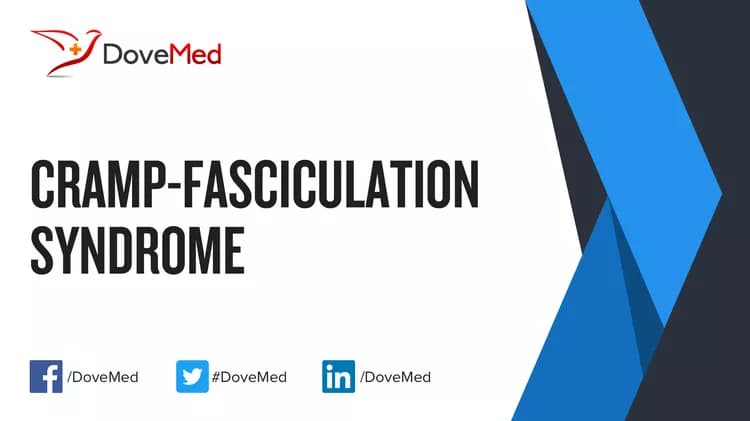What are the other Names for this Condition? (Also known as/Synonyms)
- CFS (Cramp-Fasciculation Syndrome)
What is Cramp-Fasciculation Syndrome? (Definition/Background Information)
- Cramp-Fasciculation Syndrome (CFS) is a rare condition of the muscles
- Affected people have persistent muscle twitching (fasciculations) and cramping, which can lead to muscle discomfort, pain, or tiredness
- Muscles in the leg are most commonly affected, although this condition may involve several parts of the body
- Symptoms are thought to be due to over-activity of the associated nerves. In most cases, CFS occurs sporadically in people with no family history of the condition
- There is limited information about the treatment of CFS, but certain medications have been reported as beneficial in individual cases
(Source: Cramp-Fasciculation Syndrome; Genetic and Rare Diseases Information Center (GARD) of National Center for Advancing Translational Sciences (NCATS), USA.)
Who gets Cramp-Fasciculation Syndrome? (Age and Sex Distribution)
- Cramp-Fasciculation Syndrome is a rare disorder that may be seen in children and adults
- Both males and females may be affected
- Worldwide, individuals of all racial and ethnic groups may be affected
What are the Risk Factors for Cramp-Fasciculation Syndrome? (Predisposing Factors)
Some cases of Cramp-Fasciculation Syndrome are associated with:
- Genetic disorders
- Autoimmune conditions
- Peripheral neuropathy
- Anterior-horn-cell disease
- Metabolic abnormalities
(Source: Cramp-Fasciculation Syndrome; Genetic and Rare Diseases Information Center (GARD) of National Center for Advancing Translational Sciences (NCATS), USA.)
It is important to note that having a risk factor does not mean that one will get the condition. A risk factor increases one’s chances of getting a condition compared to an individual without the risk factors. Some risk factors are more important than others.
Also, not having a risk factor does not mean that an individual will not get the condition. It is always important to discuss the effect of risk factors with your healthcare provider.
What are the Causes of Cramp-Fasciculation Syndrome? (Etiology)
In many cases, the exact underlying cause of Cramp-Fasciculation Syndrome (CFS) is unknown (idiopathic).
- In general, it is thought to be related to abnormal excitability (over-activity) of peripheral neurons. Symptoms are thought to be due to over-activity of the associated nerves
- In most cases, CFS occurs sporadically in people with no family history of the condition
(Source: Cramp-Fasciculation Syndrome; Genetic and Rare Diseases Information Center (GARD) of National Center for Advancing Translational Sciences (NCATS), USA.)
What are the Signs and Symptoms of Cramp-Fasciculation Syndrome?
- Cramp-Fasciculation Syndrome (CFS) is primarily associated with severe muscle cramps and muscle twitches occurring in otherwise healthy people. These symptoms are often triggered by physical activity and may be relieved by stretching exercises and/or massage
- Muscles in the thighs and calves are most commonly affected, although other muscles (i.e. arm, chest) can also be involved
- The severity of the condition varies significantly. In severe cases, CFS can interfere with daily activities (i.e. work, household chores) and quality of life
(Source: Cramp-Fasciculation Syndrome; Genetic and Rare Diseases Information Center (GARD) of National Center for Advancing Translational Sciences (NCATS), USA.)
How is Cramp-Fasciculation Syndrome Diagnosed?
A diagnosis of Cramp-Fasciculation Syndrome is generally based on the presence of characteristic signs and symptoms.
- A history of frequent muscle cramps, twitching, and pain (often worsened by exercise) without muscle weakness or wasting is suggestive of the condition
- Some of these symptoms may be more obvious when a person is at rest (i.e. muscle twitching). It is also important to rule out other conditions that may cause similar features
- Electromyography (EMG) or repetitive nerve stimulation studies may also be done to assess the health of muscles and the nerves that control them
- In repetitive nerve stimulation studies, muscle responses are recorded when the nerves are repetitively stimulated by small pulses of electricity
(Source: Cramp-Fasciculation Syndrome; Genetic and Rare Diseases Information Center (GARD) of National Center for Advancing Translational Sciences (NCATS), USA.)
Many clinical conditions may have similar signs and symptoms. Your healthcare provider may perform additional tests to rule out other clinical conditions to arrive at a definitive diagnosis.
What are the possible Complications of Cramp-Fasciculation Syndrome?
The complications of Cramp-Fasciculation Syndrome may include:
- Difficulty performing simple routine activities/task
- Reduced quality of daily life
Complications may occur with or without treatment, and in some cases, due to treatment also.
How is Cramp-Fasciculation Syndrome Treated?
There is limited information in the medical literature about the treatment of Cramp-Fasciculation Syndrome (CFS). Much of what is available describes individual cases. Some people with CFS improve without treatment.
- Treatment with carbamazepine, gabapentin, lamotrigine, or pregabalin (medications that reduce the hyper-excitability of nerves) was described as helpful in improving symptoms in individual cases
- Immunosuppressive therapy (e.g., prednisone) has been used to treat cases of CFS that did not respond to other treatments
- For severe cases, additional treatment options may be considered
Decisions regarding treatment should be carefully considered and discussed with a knowledgeable healthcare provider.
(Source: Cramp-Fasciculation Syndrome; Genetic and Rare Diseases Information Center (GARD) of National Center for Advancing Translational Sciences (NCATS), USA.)
How can Cramp-Fasciculation Syndrome be Prevented?
- Currently, Cramp-Fasciculation Syndrome may not be preventable, since the cause of this disorder is unknown
- Regular medical screening at periodic intervals with tests and physical examinations are recommended
What is the Prognosis of Cramp-Fasciculation Syndrome? (Outcomes/Resolutions)
- The prognosis of Cramp-Fasciculation Syndrome is dependent upon the severity of the signs and symptoms and associated complications, if any
- Individuals with mild conditions have better prognosis than those with severe symptoms and complications
- Typically, the prognosis may be assessed on a case-by-case basis
Additional and Relevant Useful Information for Cramp-Fasciculation Syndrome:
The following DoveMed website link is a useful resource for additional information:
Related Articles
Test Your Knowledge
Asked by users
Related Centers
Related Specialties
Related Physicians
Related Procedures
Related Resources
Join DoveHubs
and connect with fellow professionals


0 Comments
Please log in to post a comment.